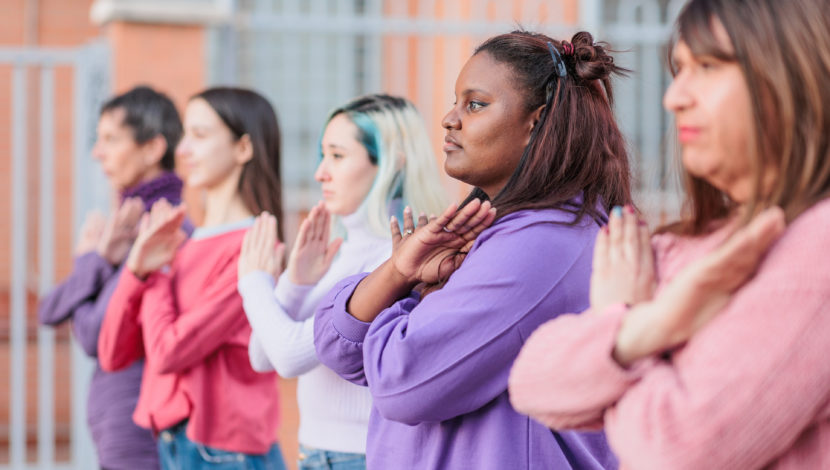The Unitarian Universalist Service Committee advances human rights through grassroots collaborations.
In the Face of War, Follow Feminist Leadership

By Rachel Gore Freed on March 7, 2022
This is a moment for us as a global community to not only respond to the humanitarian crises unfolding, but to understand and learn from the larger patterns we are witnessing in order to build toward our shared liberation. Divesting from extractive fossil fuel industries and focusing on building renewable energy is one clear transformation that will not only loosen the grip of autocrats such as Vladimir Putin, but will also support the global transition to a more just, regenerative economy. With a regenerative labor force, control moves down and out to the people and with this, a participatory democracy is more likely to flourish.
As we honor this International Women’s Day, many of us have imprinted in our mind images of women, trans, and nonbinary activists on the front lines resisting the unfolding war in Ukraine: women organizing to defend their homes; women traveling across borders and continents due to imperial wars of aggression and conquest; women with agency, doing all in their power to protect themselves and their loved ones even while bombs and rockets rain from the sky.
The heartbreak of this moment teaches us many things; but above all, it underlines that the way our societies have been organized for the past centuries—if not millenia—has not served us.
Economic and political systems that attempt to suppress women’s leadership and agency—systems founded on patriarchy, colonialism, racialized capitalism, and the exploitation of natural resources—have enriched the few at the expense of the larger human collective. The concentration of power in the hands of a small number of elite white men has not only failed to advance our collective wellbeing; it has become an active threat oppressing the safety and survival of the human species.
We see this in the way that racism and anti-Blackness have prevented people from reaching safety after being displaced from Ukraine. Even as European nations claimed they would welcome everyone harmed by Vladimir Putin’s war of aggression, Black immigrants, African students pursuing their studies in Ukraine, and others were subjected to abuse and discrimination when they tried to escape the violence. After waiting five hours to board a bus to Poland, one African medical student studying in Ukraine was told: “Sorry, we can’t admit you because this was meant only for Ukrainians.” Many others had similar experiences.
Likewise, the United States, while proclaiming its solidarity with Ukrainian refugees in this moment of crisis, continues to fail the test of humanity at its own borders. In the past year, the U.S. has forcibly deported more than 20,000 people to Haiti without the baseline hearing for asylum needs to which they are entitled under international law. The Biden administration has invoked this power of summary expulsion more than a million times since taking office. Plainly, the racism and anti-Blackness we witnessed in Europe this week are entrenched in U.S. policies and culture that props up our political and economic systems as well.
The geopolitical confrontation in Eastern Europe—with its threats of nuclear war—also reminds us of the insecurity of basing global economic activity on a system of extraction and ecological exploitation. On February 28, the United Nations’ leading panel of climate experts warned that the globe was fast approaching the point at which it would no longer be possible “to secure a sustainable and liveable future for all.” Yet even with the dangers so clearly before us, we continue to emit carbon. Vladimir Putin has been able to further his aggression—and ordinary people in Russia and around the world are suffering from his actions—in large part because our global economy continues to rely on the extraction and burning of planet-warming fossil fuels.
While these systems of patriarchy and exploitation have failed us, there is the alternative. Centering gender non-conforming and women’s leadership and feminist models for collective wellbeing that depend on regeneration, rather than extraction; collaboration, rather than conquest.
For the past few years, I have been part of a funders collaborative strategizing around how to further this vision together. This collaboration was initially envisioned by the Grassroots Global Justice Alliance (GGJ), Grassroots International (GRI), Indigenous Environmental Network (IEN), and the World March of Women (WMW). Its purpose is to “build unity and strengthen grassroots feminist movements, particularly of Indigenous and Afro-descendent peoples, peasants and youth, and multi-racial movements more broadly, where backlashes against women, gender non-conforming, LGBTQI and Two Spirit people have been significantly acute” (as stated by the collective). Together, we’re working to create space and funding for grassroots feminist power-building and to collectively sharpen the international articulation of feminist thought and practice that is necessary to fuel these movements over the long term.
The collaboration is built around movement-building to support a feminist, anti-racist regenerative economy. A regenerative economy is one whose purpose is to further ecological restoration, community protection, equitable partnerships, and fair participatory processes. It is the opposite of the kind of system founded in militarism, extraction, and inequality that we see wreaking so much damage in Ukraine and around the world today.
On this International Women’s Day, we can look to women of color, gender non-conforming, LGBTQI activists for the transformative vision we need. It is not only possible to change course from the ideologies and systems that have led to the present crisis; it is necessary to do so, if humanity is to survive and flourish in the centuries ahead.
Image Credit: iStock—Alfonso Sangiao

